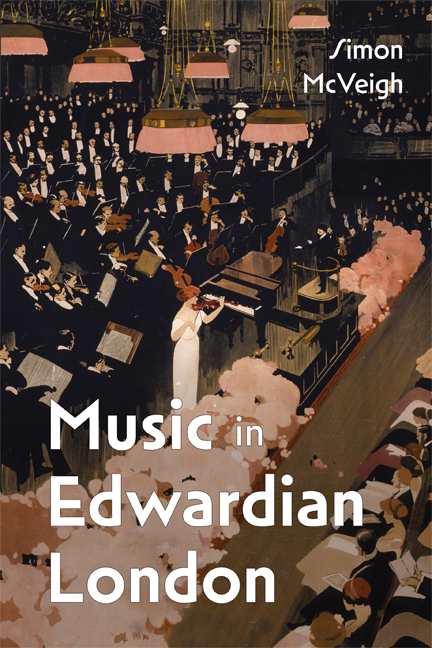Book contents
- Frontmatter
- Dedication
- Contents
- List of Illustrations
- Preface
- 1 Edwardian Soundscapes
- 2 Mapping a Musical City: Place (and Class)
- 3 Mapping a Musical City: Time (and Taste)
- 4 London as Musical Hub: Europe, America, Empire
- 5 The British Question
- 6 Britain and ‘Others’
- 7 Hidden Voices
- 8 From Battersea to Bermondsey: Suburban Music and Local Politics
- 9 London’s Music: An Overview
- Sources and Bibliography
- Index
- Miscellaneous Endmatter
7 - Hidden Voices
Published online by Cambridge University Press: 09 May 2024
- Frontmatter
- Dedication
- Contents
- List of Illustrations
- Preface
- 1 Edwardian Soundscapes
- 2 Mapping a Musical City: Place (and Class)
- 3 Mapping a Musical City: Time (and Taste)
- 4 London as Musical Hub: Europe, America, Empire
- 5 The British Question
- 6 Britain and ‘Others’
- 7 Hidden Voices
- 8 From Battersea to Bermondsey: Suburban Music and Local Politics
- 9 London’s Music: An Overview
- Sources and Bibliography
- Index
- Miscellaneous Endmatter
Summary
SO FAR, THIS BOOK has concentrated on when, where and which music was to be heard in London, and its relationship with the wider world. But who initiated these trends – and what made them happen? Who was leading cultural change under the banner of improving English music?
❧ Power and money
Church and state were still influential in London’s music, whether through liturgical worship and organ recitals, or through royal events and military bands in public spaces. Musicians occasionally voiced exasperated opinions about establishment influence – such as Stanford chastising a church congress for their neglect of Tudor composers, or Mackenzie-Rogan lobbying for all-British music for state ceremonials. But neither church nor state were the prime movers.
Who were, then? Of course some charismatic individuals undoubtedly wielded power, whether through interpretative genius, innovative programming or entrepreneurial flair. London’s orchestras might have languished without Richter, Wood and Beecham, not to mention the self-managing London Symphony Orchestra. A second sphere of influence lay in the conservatoires, something dominating modern accounts, especially the role of RCM professors in the English Musical Renaissance. There is no mistaking their impact on orchestral training, nor that of the Royal Military School of Music at Kneller Hall on wind-playing. Indeed, conservatoire values were absorbed at every level, from their grade exam syllabuses to the programming of myriad choral and orchestral societies, across London and beyond.
But behind the scenes many others played a part in the complex web of disparate forces involved in the nascent ‘music industry’. These were often hard-nosed and seemingly in thrall to theatre runs and audience figures – but a few possessed sufficient authority and motivation to exert influence over public taste. Only through these ‘hidden’ voices can we analyse two critical levers of London’s musical life: power and money.
❧ Musical mediators
CRITICS
Shaw’s barb that ‘the English do not know what to think’ without laborious coaching was quoted in Chapter 1: and Londoners were influenced by a powerful set of men writing across a wide range of newspapers and magazines, who enjoyed telling people exactly ‘what to think’.
- Type
- Chapter
- Information
- Music in Edwardian London , pp. 216 - 252Publisher: Boydell & BrewerPrint publication year: 2024



